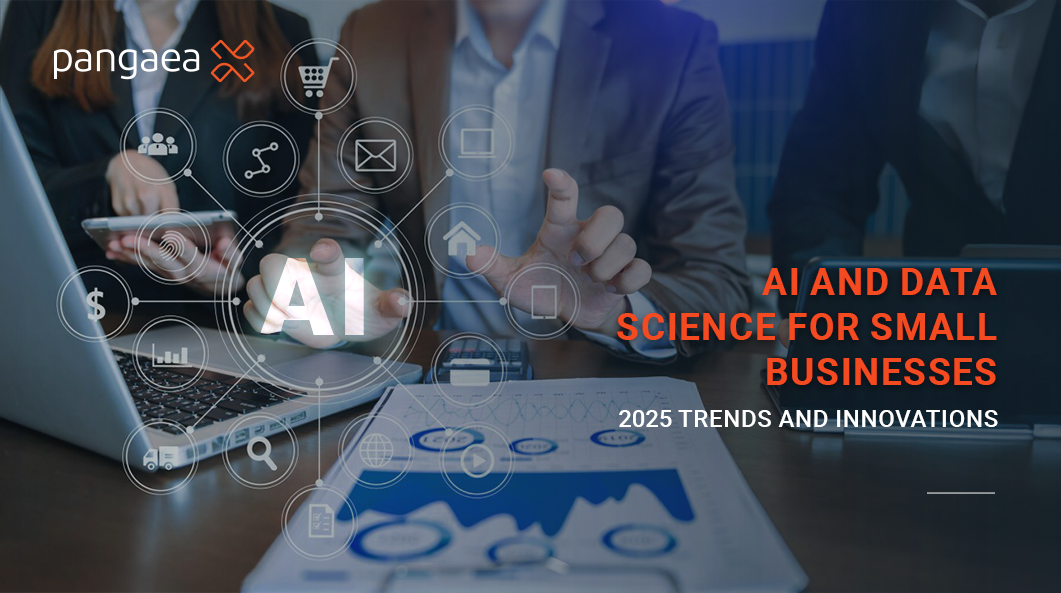AI and Data Science for Small Businesses: 2025 Trends and Innovations

Table of Contents
1. The Role of AI and Data Science in Small Businesses in 2025
2. Why Small Businesses Need These Technologies Now
3. Key Challenges in Combining AI and Data Science
4. Top AI Trends Reshaping Small Businesses in 2025
5. Data Science Driving Informed Decision-Making
6. Challenges and Considerations in AI Adoption
7. How Small Businesses Can Get Started with AI and Data Science
8. Conclusion
In 2025, small businesses are no longer just competing with their local peers—they’re navigating a global, tech-driven marketplace. At the heart of this transformation? Artificial Intelligence (AI) and data science. These twin powerhouses are reshaping how small businesses operate, compete, and grow, offering tools once reserved for corporate giants. Businesses leveraging AI for decision-making have reported a 25% improvement in operational efficiency and a 20% increase in revenue.
This blog dives into the latest trends, practical applications, and strategies to help small business owners harness these innovations in 2025.
The Role of AI and Data Science in Small Businesses in 2025
AI and data science have become indispensable tools for small businesses aiming to thrive in an increasingly competitive environment. These technologies are no longer just for large corporations with massive budgets—they have become more accessible, affordable, and effective for businesses of all sizes.
AI and data science work together to provide deeper customer insights, automate routine tasks, and improve decision-making. Businesses can now predict customer behavior, adjust pricing in real time, and automate customer service without needing large in-house teams. AI algorithms analyze historical data to identify trends and forecast demand, while machine learning models refine these predictions over time, improving accuracy and efficiency.
AI-powered customer insights also drive more targeted and effective marketing strategies. Businesses can segment customers based on behavior, preferences, and purchase history, delivering personalized offers and product recommendations that increase engagement and conversion rates. This level of customization was once out of reach for small businesses, but AI has made it attainable and cost-effective.
Operational efficiency has also improved significantly. AI automates time-consuming administrative tasks, such as scheduling, data entry, and inventory management. Data science tools turn raw data into actionable insights, allowing business owners to make informed decisions quickly. This reduces costs and frees up resources to focus on strategic growth.
Why Small Businesses Need These Technologies Now
The business landscape is evolving rapidly, and small businesses face increasing pressure to keep up with technological advancements. Customers expect faster responses, personalized experiences, and seamless transactions. Businesses that fail to adapt risk losing customers to competitors who are more tech-savvy and responsive.
AI and data science provide small businesses with the tools to:
- Enhance customer experience – AI-powered chatbots and recommendation engines create tailored customer experiences, improving satisfaction and loyalty.
- Reduce operational costs – Automating repetitive tasks reduces labor costs and minimizes human error.
- Scale operations efficiently – AI enables businesses to handle increased workloads without proportional increases in costs.
- Make data-driven decisions – Analyzing customer behavior, market trends, and business performance helps businesses respond quickly to changes and opportunities.
In a competitive market, relying on intuition and traditional methods is no longer enough. Businesses that leverage AI and data science can anticipate market shifts, respond to customer needs, and optimize internal processes—all essential for sustainable growth.
Key Challenges in Combining AI and Data Science
While AI and data science offer significant benefits, small businesses often face challenges in adopting and integrating these technologies effectively.
1. Cost and Resource Limitations
Although AI tools have become more affordable, many small businesses operate on tight budgets. Investing in AI solutions requires a clear understanding of the potential return on investment (ROI). Businesses must carefully evaluate costs and benefits before committing to AI adoption.
2. Data Management and Quality
AI and data science rely on high-quality data to generate accurate insights. Small businesses often struggle with data collection, organization, and analysis. Incomplete or inaccurate data can lead to flawed predictions and poor decision-making. Establishing a structured data management system is crucial for maximizing the value of AI tools.
3. Lack of Expertise
Implementing AI and data science solutions requires technical expertise. Small businesses may lack the in-house skills needed to develop, deploy, and maintain AI models. Hiring full-time specialists can be expensive, but outsourcing or using pre-built AI platforms can bridge this gap.
4. Integration with Existing Systems
Many small businesses use legacy systems that are not compatible with modern AI platforms. Integrating AI with existing infrastructure can be complex and time-consuming. Choosing scalable and flexible AI solutions that integrate seamlessly with current systems reduces friction and accelerates adoption.
Top AI Trends Reshaping Small Businesses in 2025
AI is evolving rapidly, with new trends redefining how small businesses operate and compete. Adopting these technologies helps businesses streamline processes and enhance customer engagement. Businesses that stay ahead of these trends can unlock new growth opportunities and gain a competitive edge. Here are some new AI Trends in Small Business:
1. Generative AI for Content and Engagement
Generative AI enables small businesses to create high-quality content quickly and efficiently. From blog posts and product descriptions to social media updates and email campaigns, AI-generated content reduces the time and effort required for content creation.
AI-driven customer service tools also enhance customer engagement by delivering personalized responses and recommendations. Businesses can use AI chatbots to handle customer inquiries, process orders, and provide support 24/7, improving customer satisfaction and reducing operational costs.
2. Agentic AI: Precision Task Automation
Agentic AI automates complex tasks with minimal human intervention. AI agents can schedule appointments, manage inventory, and monitor business performance in real time. This level of automation increases efficiency and allows businesses to focus on strategic growth.
Agentic AI platforms are designed to scale with business needs, offering flexible pricing models that allow small businesses to pay for what they use. This makes it easier for businesses to experiment with AI without committing to long-term contracts or high upfront costs.
3. Multimodal AI for Deeper Insights
Multimodal AI combines data from multiple sources—text, images, audio, and video—to provide a more comprehensive understanding of customer behavior and market trends. This enables businesses to identify patterns and opportunities that would be missed with traditional data analysis.
Businesses can use multimodal AI to analyze customer reviews, social media activity, and sales data simultaneously, providing a complete view of customer preferences and market dynamics. This leads to more effective marketing strategies and better product development decisions.
4. AI-Powered Customer Service Solutions
AI-driven customer service platforms provide fast, accurate, and personalized support. Chatbots can handle routine inquiries, while AI-powered voice assistants can offer real-time guidance and troubleshooting. This reduces response times, increases customer satisfaction, and frees up human agents for more complex issues.
AI-based customer service platforms also use natural language processing (NLP) to understand and respond to customer queries in a more conversational and human-like manner. This enhances the customer experience and builds stronger relationships with customers.
Data Science Driving Informed Decision-Making
Data science helps small businesses convert raw data into actionable insights. Understanding customer behavior, market trends, and operational performance empowers businesses to make smarter, faster decisions. By analyzing large datasets, businesses can uncover hidden opportunities and address challenges proactively.
1. Leveraging Big Data Analytics
Big data analytics allows businesses to analyze large datasets and extract meaningful insights. This helps businesses identify trends, measure performance, and uncover growth opportunities. AI-driven analytics platforms can process vast amounts of data quickly, providing real-time insights that enable faster decision-making.
2. Predictive Analytics for Growth
Predictive analytics uses historical data and machine learning models to forecast future trends and outcomes. This helps businesses anticipate customer needs, optimize inventory levels, and adjust pricing strategies. Predictive analytics also supports customer retention by identifying potential churn risks and enabling proactive engagement strategies.
3. Personalized Marketing Strategies
AI-driven customer segmentation allows businesses to deliver highly targeted marketing campaigns. Personalized recommendations and tailored promotions increase customer engagement and conversion rates. AI also optimizes ad placements and bidding strategies, maximizing the return on marketing spend.
Challenges and Considerations in AI Adoption
While AI adoption offers numerous benefits, small businesses need to navigate challenges carefully. Understanding the financial implications, managing data privacy, and ensuring smooth integration are critical for successful implementation. Proper planning and support from experts can help overcome these hurdles. Here are Some Challenges Small Businesses Face:
Cost and Resource Constraints
AI adoption requires careful cost-benefit analysis. Businesses should start with low-cost solutions and scale up as they see positive ROI.
Data Privacy and Security
Protecting customer data is critical. Businesses must comply with data protection regulations and invest in encryption and secure storage solutions.
Integration with Existing Systems
Compatibility issues with legacy systems can slow down AI adoption. Choosing flexible and scalable AI solutions reduces integration challenges.
How Small Businesses Can Get Started with AI and Data Science
Getting started with AI and data science doesn’t have to be overwhelming. Small businesses should begin with scalable tools and platforms, focusing on areas with the highest potential for improvement. Building internal expertise and seeking external support when needed ensures a smooth transition.
Choosing the Right Tools and Platforms
Small businesses should start with AI platforms that offer scalable pricing and user-friendly interfaces. Open-source tools and SaaS solutions provide low-cost entry points for AI adoption. Investing in platforms with built-in automation and predictive capabilities can help businesses quickly identify trends and improve decision-making.
Upskilling Teams for an AI-Driven Future
Training employees in AI and data science builds internal expertise and accelerates adoption. Free resources and online training programs make it easier for small businesses to build AI knowledge. Encouraging employees to gain hands-on experience with AI tools ensures they can apply their learning to real-world challenges.
Hiring Freelance Data Scientists with AI Expertise
Freelance platforms provide access to experienced data scientists and AI specialists. Businesses can hire freelancers for specific projects or ongoing support, reducing costs and increasing flexibility. Platforms like Pangaea X connect businesses with skilled freelance data scientists with AI expertise, ensuring that small businesses can leverage advanced AI solutions without long-term commitments. By working with freelance professionals, small businesses can quickly scale their AI initiatives and improve overall efficiency.
Conclusion
In 2025, AI and data science are essential for small businesses to stay competitive and grow. These technologies enhance efficiency, automate tasks, and provide data-driven insights to improve decision-making. AI-powered customer personalization and predictive analytics help businesses anticipate customer needs, adjust strategies in real time, and streamline operations.
Adopting AI allows small businesses to reduce costs, improve customer satisfaction, and increase revenue. Data insights enable targeted marketing, better inventory management, and faster responses to market changes. Businesses that leverage AI effectively gain a competitive edge and drive sustainable growth.Platforms like Pangaea X make it easier for small businesses to access AI expertise. By connecting with freelance data scientists and analysts, businesses can implement AI solutions without the cost of a full-time hire. Leveraging this talent pool allows businesses to accelerate growth and stay ahead in a fast-changing market.
Get your data results fast and accelerate your business performance with the insights you need today.



